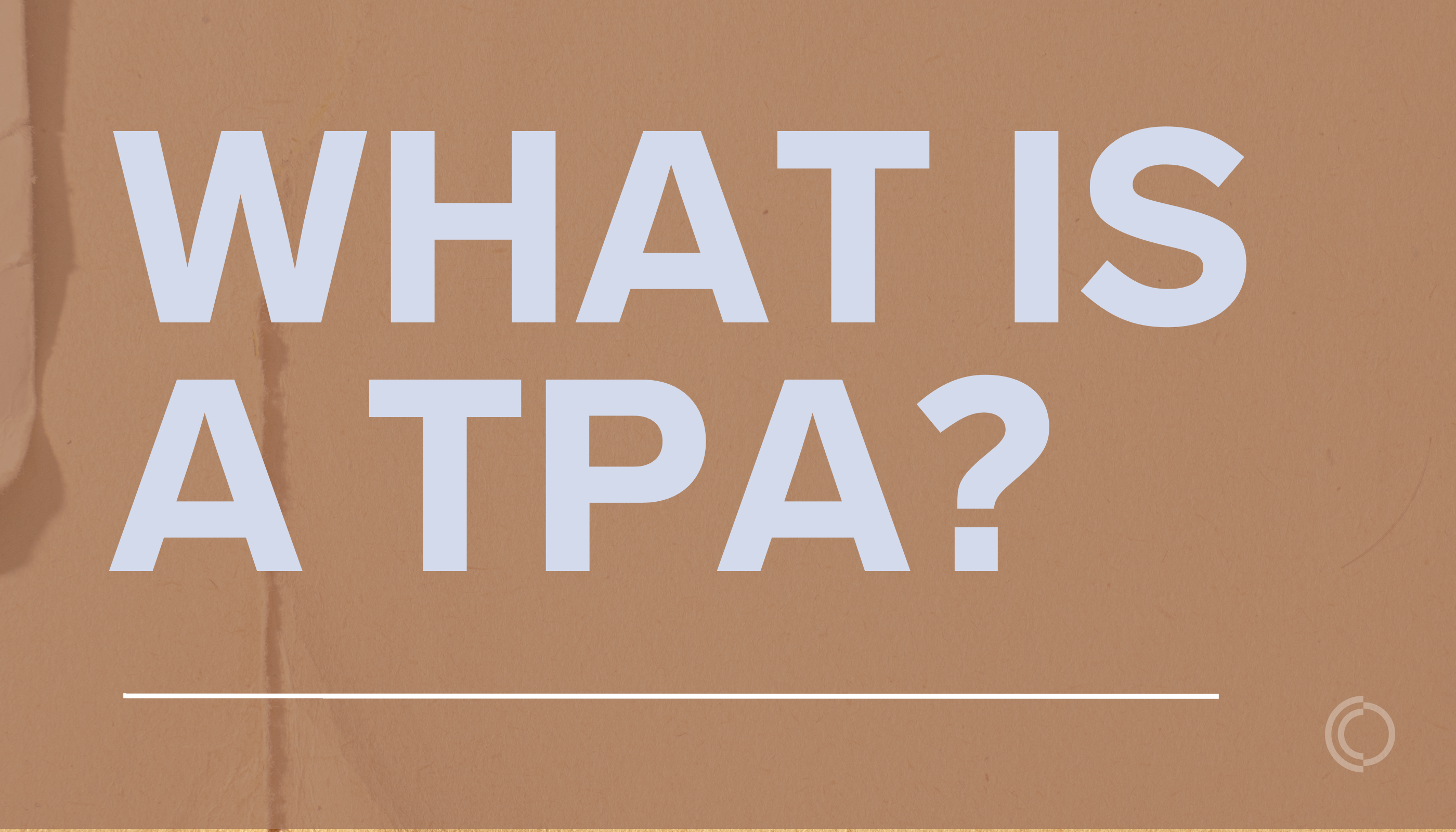A third-party administrator (TPA) in the health insurance industry is an administrative services provider that delivers support for self-insured health plans. Here’s what they do, how they differ from administrative services only (ASO) providers, and the benefits for plan administration.
Outsourcing to a TPA like Collective Health can be an attractive option for organizations looking to take advantage of the significant cost savings associated with self-insuring their healthcare plans.
By partnering with a trusted TPA, companies can enjoy overall cost savings by self-insuring their health plans without significantly adding to the administrative burden for human resources (HR) and finance teams.
A TPA can also work with an employer to implement employee benefit plans, can help familiarize the employer with healthcare options they may not have considered, and can provide ongoing member support.
Table of contents
- What is TPA health insurance in a health insurance context?
- TPA vs ASO: what’s the difference?
- What is the difference between a TPA and an insurance company
- Benefits of hiring a third-party administrator
- What services do TPAs provide?
- Choosing the Best Health Plan TPA for Your Company
What is a TPA for health insurance?
A third-party administrator (TPA) provides administrative services for self-funded health plans, sometimes referred to as self-insured health plans, in the health insurance industry. A TPA can also provide access to healthcare networks and may be able to source additional vendors, such as stop-loss insurers.
Unlike an insurer, a TPA does not take on the financial risk for a company’s health benefits claims.
Because a TPA works as a connector between businesses with self-funded health plans and insurance providers, the term TPA Insurance isn’t accurate. TPAs may provide a valuable service by adjudicating claims under self-funded health plans and working with healthcare provider networks.
TPA providers may also maintain relationships with insurers through which employers may access specialized insurance coverage, called stop-loss insurance, which helps limit high claims risks for employers that offer self-funded health plans. In this case, as well, the TPA is not the insurer.
TPA vs ASO: what’s the difference?
When considering a self-funded health plan, you’ll encounter both TPAs and Administrative Services Only (ASO) providers.
TPAs may operate independent of health insurance companies, in such cases potentially offering more flexibility in plan structure and healthcare network providers. An
ASO is typically a wholly-owned subsidiary of a health insurance company, which may limit your company’s provider network options to those available from the parent insurer.
Both can provide support for self-funded health plans. However, each serves a specific need. These two structures share some similarities but also differ in important ways:
| TPA vs ASO | TPA | ASO |
|---|---|---|
| Autonomy | A TPA may operate independent of insurance companies. | An ASO is typically a subsidiary of a health insurance company. |
| Networks | A TPA often offers several PPO networks to choose from. | An ASO is typically limited to provider networks from the parent insurer. |
| Service | A TPA can assist in a wide range of areas, including enhanced reporting. | An ASO typically has limited services it can provide. |
Outside of that notable difference, TPAs and ASOs both provide services for your self-funded healthcare plan. For example, both may allow outsourcing of insurance claims processing and record keeping.
By partnering with a TPA, companies can often gain more coverage options as well as funding and reimbursement options. While TPA and ASOs may perform similar functions, the independent management of some TPAs versus the ASO as a subsidiary of a health insurer can make a difference in a plan’s network options.
TPAs have their benefits. Once you’ve chosen a plan structure, a TPA can provide support for the plan, streamlining the process for plan members.
What is the difference between a TPA and an insurance company
Most people are familiar with how a health insurance policy works at a basic level:
The insurance provider sells coverage to protect against healthcare expenses. In exchange for insurance premiums, the insurer shoulders the risk of claims that exceed collected premiums. If actual claim costs come in lower than collected premiums, the insurer typically doesn’t refund premiums.
In a group health insurance context, the insurer managing the fully-insured health plan provides coverage but also handles many administrative tasks, such as claims processing and Employee Retirement Income Security Act (ERISA) compliance.
Instead of providing insurance, a TPA provides administrative services for claims to support a self-funded health plan. TPAs may also help coordinate reporting from outside vendors. Unlike an insurer, a third-party administrator doesn’t take on any risk for claims and doesn’t provide insurance or health benefits.
With a self-funded health plan, the company pays for actual employee healthcare costs through a fund, a model that can provide cost-saving opportunities, while the TPA provides support for claims adjudication and other administrative tasks.
Benefits of hiring a third party administrator
It’s best to discuss the benefits of hiring a TPA in the context of designing and managing a cost-effective self-funded healthcare plan. A TPA’s first role is that of service provider to the plan, a role that continues as your self-funded healthcare plan evolves.
“The greatest “product” advantage TPAs have is flexibility and personalized service. Every TPA-administered plan is custom-designed for the plan sponsor’s needs and specific workforce.”– Fred Hunt, past President, Society of Professional Benefits Administrators (SPBA)
TPAs supporting self-insured healthcare plans also may take on support for administrative burdens that typically otherwise rest on the human resources and finance teams within an organization. These admin tasks might include:
- Member enrollment
- Claims adjudication
- Reimbursement
- Reporting and record-keeping
- Consolidated billing
In addition, a TPA may also offer detailed reporting, providing a better understanding of healthcare expenses.
What services do TPAs provide?
The services provided by a TPA may span a broad spectrum and can often be customized. As in many industries, you can tailor your agreement to match your requirements. TPA services can include:
- Health benefits reporting and analytics: A TPA that reports on your health program’s networks and point solutions should provide regular and reliable reporting on claims, members, and other metrics associated with your self-funded plan.
- Reducing the burden on your HR department: Your TPA can help with open enrollment for your plan. Your TPA may also be able to assist with communication materials or onboarding events.
- Adjudicating claims: A TPA can adjudicate whether claims are reimbursable under the plan and take care of processing member claims for your business.
- Customer service for plan members: Enlist the help of your TPA to answer plan-related questions and provide member assistance.
- Healthcare provider network access: A TPA can help you connect your self-funded plan to trusted healthcare provider networks. You don’t need to assemble all the parts of your plan yourself.
- Detailed healthcare expense reporting: Gain access to more detailed healthcare expense data without compromising employee privacy. A TPA can provide you with reports to better understand healthcare costs. Use the data to work with your TPA and design wellness programs or health-based incentives that can reduce costs in the future.
- Supporting stop-loss coverage by working with insurers: Stop-loss insurance reduces the risk for self-funded health plans. If actual costs outrun expected costs, a stop-loss policy can cover some or all of the unexpected expenses.
- Consolidating payments for providers: A self-funded plan may receive services from multiple providers. A TPA may be able to facilitate making payments to these service providers, thus streamlining your administrative lift.
- Working with brokers and health insurance consultants: Even experts in the business turn to TPAs for their broad understanding of how the pieces of the health insurance puzzle fit together.
While a TPA can handle a wide range of healthcare plan needs, you can also often choose customized services to meet your needs. For example, some businesses might choose not to use stop-loss insurance. Your TPA agreement isn’t necessarily all-or-none, but it’s often more efficient to utilize a TPA.
Choosing the best health plan TPA for your company
TPAs offer a wide variety of benefits for companies considering self-funded healthcare plans. To learn more about how our TPA services can benefit your business or your clients, take a self-guided tour of the Collective Health platform.

Learn more about our TPA services by taking a self-guided tour of the Collective Health platform.
Article Sources
- Bonner, M. (2019), The Largest Third-Party Administrators.
- Flanagan, T. (2016), What Is a TPA in Health Insurance.
- Healthcare.Gov, ‘Self-Insured Plan’.
- Internal Revenue Service (2022), Third-Party Administrators and Health Plan Providers.
- Navi (2022), Third Party Administrator (TPA) in Health Insurance.
- Society of Professional Benefits Administrators, ‘Frequently Asked Questions about TPAs’.



